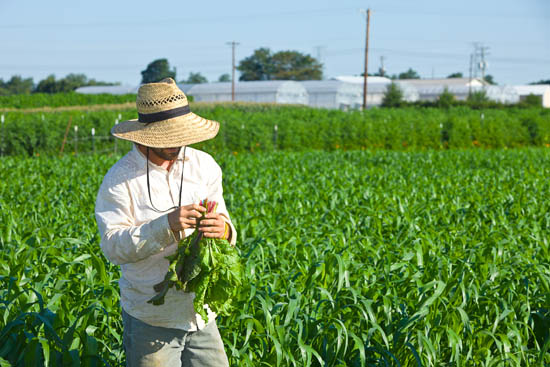UKAg jumps into wholesale as teaching tool for Kentucky farmers
UKAg jumps into wholesale as teaching tool for Kentucky farmers

Sometimes, to teach someone to swim, you have to jump in the water yourself. The University of Kentucky College of Agriculture, Food and Environment recently took the plunge into wholesale sales and GAP certification, and Kentucky growers could start swimming in the wholesale market on their own, supported by UKAg’s experience.
GAP, short for Good Agricultural Practices, and the related Good Handling Practices, or GHP, are voluntary food security and safety practices to minimize microbial food safety risks throughout the production, packaging, handling and storage phases. Many, if not most, food distributors require it of their suppliers.
“It’s all important: worker hygiene, how you harvest, how you pack, how you store your food, how you ship your food,” said Paul Priyesh Vijayakumar,principal investigator of the college’s Food Systems Innovation Center. “You’re trying to show you have procedures in place to reduce the risk of contamination from chemical, physical or microbial sources at every point along the way.”
Vijayakumar works with food processors and producers to understand aspects of food safety as it pertains to GAPs and the upcoming rollout of the Food Safety Modernization Act.
“It’s good for farmers, because it shows their commitment to minimize food safety risks and increases customer confidence. It’s good for the consumer, because as best as it can, it helps reduce risk,” he said.
The UK Department of Horticulture decided to use three acres at its research farm in Lexington to grow produce for the wholesale market. In May they became GAP/GHP certified by the U.S Department of Agriculture.
Mark Williams, UK horticulture professor and director of UK’s sustainable agriculture program, said the intent is not to compete with Kentucky farmers.
“We’re trying to increase production of wholesale farming among local farmers and, at the same time, increase awareness and training in good agricultural practices,” he said.
To provide such training to farmers, the College of Agriculture, Food and Environment has joined with the Food Connection at UK, UK Cooperative Extension Service, Kentucky Department of Agriculture, Bluegrass Farm to Table and Kentucky Horticulture Council.
At a recent pilot GAP-certification workshop for farmers at the UK Horticulture Research Farm, a small number of invited Central Kentucky producers—mostly produce growers along with a few livestock producers—gathered to hear what has to be done to receive USDA GAP/GHP certification.
Food safety practices can be a stumbling block when farmers try to find a distributor for their products. There are a number of certifying agencies that focus on anyone from massive growers down to smaller producers. To be effective, food safety programs must be tailored to the specific farm.
The Food Connection at UK works closely with the university’s dining contractor, Aramark, to find sources for local and Kentucky proud products and to identify and create strategies to address key barriers in the food system.
“Food safety kept coming up as a major obstacle for getting farmers into the distributors who then sell to the university,” said Lilian Brislen, The Food Connection executive director.
Piazza Produce and Sysco are the main food distributors for Aramark. Both require GAP certification.
“There are not a lot of farms that are GAP-certified,” KDA’s Joshua Lindau said. “Currently there are only three farms that are USDA GAP/GHP certified in Kentucky, one of which is the UK organic farm. There are, however, a plethora of companies that conduct GAP audits, so the total number of GAP-certified farms could be higher. We do know that in 2013 five farms used the Horticulture Council cost-share grant for third-party GAP audits, and in 2014 seven farms used the grant.”
Aside from workshops, UKAg and KDA offer on-farm consultations and mock audits to help prepare farmers. Lindau will conduct the mock audits, andVijayakumar and Kristi Durbin, UK food safety field extension associate, will be available to walk farmers through the process on their farms, reviewing topics such as how to write a food safety manual, how to interpret the USDA guidelines and how to evaluate their GAP-readiness.
“I provide the farming perspective for the growers,” Durbin said. “I bridge the gap between the food safety and the farming practices, so I can look at their farming practices and their post-harvest handling procedures and help them figure out what they need to change.”
“Here’s the thing,” Williams said. “Farmers can view this as extra expense—certification can cost about $2,000 a year depending on the scope—and it is extra trouble, but it protects the food system, and it helps the farmer reduce their risk of hurting somebody.”
It may also open them up to a growing local wholesale market, but Williams isn’t sure yet if there is money to be made in that arena.
“The jury is still out for me, because we haven’t been in this long enough,” he said. “But the idea is we’ll do this for a few years, get some publications out to farmers and then be able to tell them how much money they can expect to make and how to get GAP certified.”
Crops Economics Food Science Horticulture Research

